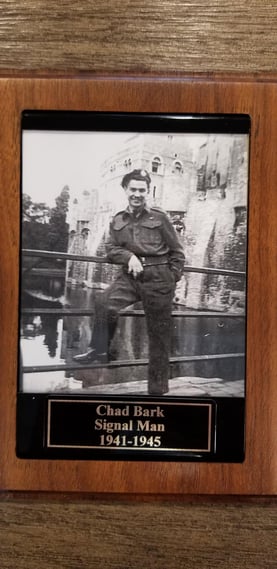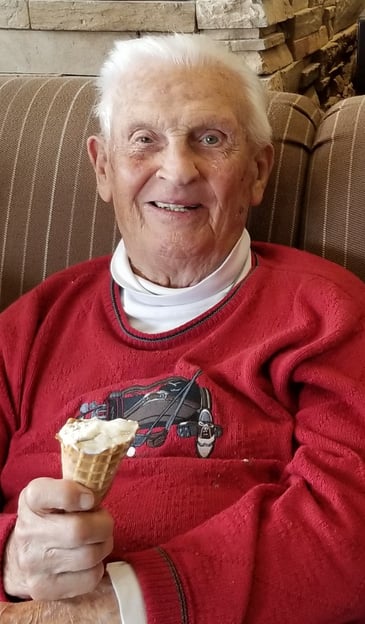As Remembrance Day approaches, we take a moment to reflect on those who served in the world wars. Among them is Chad Bark, an army veteran with a distinctive story. Unlike the harrowing tales from the front lines which are often associated with war, Chad's experience was unique, and one shaped by his role in the Signal Corps.
 A military dream dashed and Tank Corps training in Britain
A military dream dashed and Tank Corps training in Britain
Inspired by his father — an army officer in World War I — Chad's journey into the army began with aspirations of joining the Air Force. However, fate had other plans, and after being deemed ineligible for a pilot’s license due to colour blindness, he eventually enlisted in the army. Soon after his enlistment, Bark and his good friend Alec Brown were sent to southern England via northern Scotland to train in the tank core. “He (Alec) went the mechanical route, so he was driving. I went the gunnery route which was shooting the cannon. That lasted for 6 weeks,” Chad recalled.
Chosen for the Signal Corps
Bark was summoned to the orderly room by his superiors one day, believing he would soon be heading to the battlefield as a tank gunman. He thought he was being drafted to Italy, which was something he really wanted. “I said, ‘hot dog, I’d like to see Italy’, but the officer said ‘you’re not going there, you’re going to the Signal Corps.”
He was introduced to the world of intelligence in the form of a group called Cipher, where his job would be to create and decipher codes. "They had gone through the Canadian Army in the south of England and chosen 20 candidates for Cipher,” he recalled. “I always figured I was not smart enough,” he said.
Chad's modesty aside, his role was pivotal. He put messages into code and deciphered them, ensuring secure communications. To fulfill this role he was sent to the British Intelligence School in Yorkshire, northern England, where he trained in the Signal Corps. With communication and information so vital in war times, intelligence trainees were “under lock and key” according to Bark. Following his training Chad would go to London to do his duty, coding and decoding official military messages. Frustrations with his role and recollections of D-Day
Frustrations with his role and recollections of D-Day
Despite his frustrations at not seeing action, Chad’s role — while not filled with battlefield confrontations — came with a weight of responsibility and importance. "It was a boring existence, but they thought it was important," Chad said, admitting that his superiors thought his role to be a crucial one. Even though he wasn’t in the thick of combat, Chad's memories of the war were coloured with moments of intensity. Recalling D-Day, he described the dramatic sight of the sky blanketed with airplanes, noting, "It was the most dramatic thing I’d ever seen. The sky was covered from horizon to horizon, 360 degrees with airplanes, most of them Dakotas towing gliders filled with allied soldiers."
After the war ended
In post-war Europe, Bark reminisced about the kind-heartedness of the locals, especially in Holland. Canadian troops famously liberated the Dutch people and Chad was treated to the warmest of receptions during his time there. "The people were so nice," he shared, reflecting on how the hospitality of a group of elderly women gave him a sense of home and comfort amid the turmoil. Chad's story reminds us of the diverse experiences of those in service and that every veteran has a unique tale to tell. Being the humble and honest individual he is, Chad insisted that he should not be made out to be a hero, but anyone well-versed in both World Wars would never deny the importance of his role.
As we honour Remembrance Day, let's remember not only the brave soldiers who fought in the trenches but also the ones winning the mental battle in the background like Chad Bark, who, in their own way, contributed to the war effort. His story is a testament to the fact that every role played a part in shaping history.

.jpg)
